Simplify Your Genealogy Research: Request Church Genealogy Records With Our 26-Letter Template
Welcome to our warm and inviting online haven, where the magic of genealogy and the exploration of our rich heritage unfold before your eyes. Here, we extend an open invitation to embark on a fascinating journey of discovery, where the tales of our ancestors come alive, and the whispers of the past stir our hearts. Whether you’re a curious soul yearning to unravel the mysteries of your family lineage or a passionate researcher delving into the annals of history, our platform is thoughtfully crafted to be your trusted companion. Together, we are driven by a shared purpose—to empower you with a wealth of resources, insights, and tools, empowering you to piece together the intricate tapestry of your heritage and forge meaningful connections with the lives that paved the way for ours. So, take a step into this captivating realm where the past meets the present, where stories come alive, and where we celebrate the beautiful tapestry of humanity that binds us all. Get ready to embark on an extraordinary adventure of self-discovery, where you’ll uncover the hidden gems of your lineage and cultivate a deep appreciation for the captivating stories that make us who we are.
#1: Basic Request Letter:
The Basic Request Letter serves as a straightforward and concise communication to formally request access to genealogy records from the church. This type of letter aims to express a genuine interest in exploring one’s family history and ancestry. It highlights the importance of genealogy research as a means to understand one’s heritage, connect with ancestral roots, and preserve family narratives for future generations. The purpose of the Basic Request Letter is to establish a formal request for access to genealogy records, emphasizing the responsible and respectful use of the information obtained. It showcases a sincere desire to delve into personal genealogical research and demonstrates an understanding of the significance of these records in unraveling the intricate tapestry of one’s family history. Overall, the Basic Request Letter sets the foundation for establishing a respectful and collaborative relationship with the church to access the valuable genealogy records they maintain.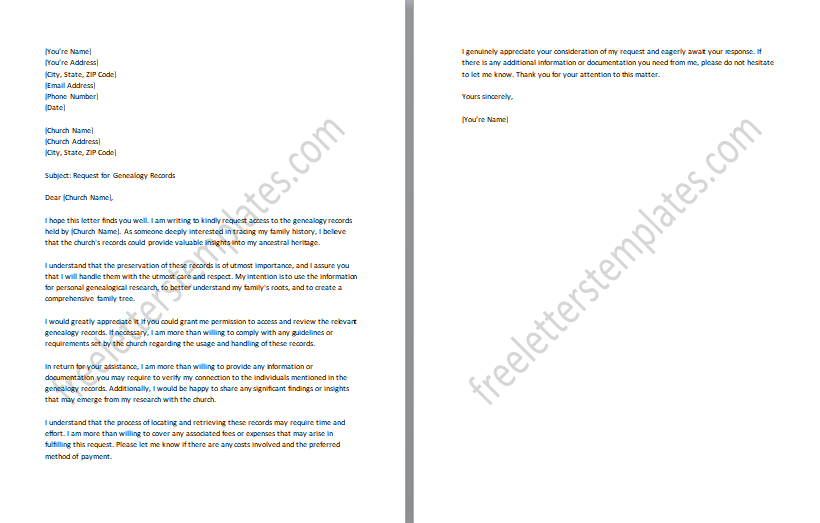
#2: Detailed Genealogy Request:
The Detailed Genealogy Request letter serves as a comprehensive communication, providing specific details about the desired genealogy records and the purpose behind the request. This type of letter aims to convey a deep interest in delving into one’s family history and ancestry by requesting access to specific genealogy records held by the church. It emphasizes the need for detailed information such as birth records, marriage records, baptismal certificates, and any available ancestral lineage documentation. The purpose of the Detailed Genealogy Request letter is to provide a clear understanding of the specific records needed for comprehensive research and to establish the importance of accessing these records to construct an accurate family tree, trace familial connections, and preserve the family’s historical narrative. By outlining the specific details and purpose, this letter demonstrates a commitment to meticulous genealogical investigation and emphasizes the value of the requested records in unraveling one’s ancestral heritage. Ultimately, the Detailed Genealogy Request letter serves to establish a focused and purposeful approach to genealogy research and foster a collaborative relationship with the church to obtain the desired genealogy records.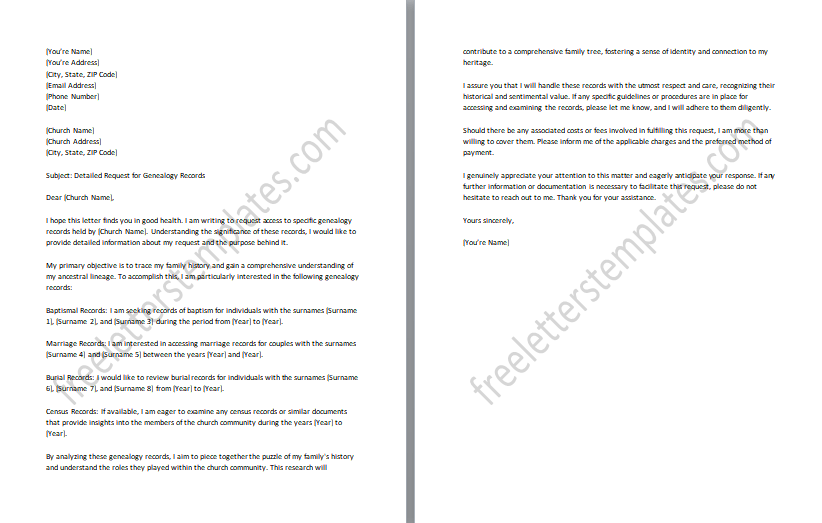
#3: Historical Importance Request:
The Historical Importance Request letter is crafted to highlight the immense historical significance of the genealogy records maintained by the church. This type of letter emphasizes the valuable role these records play in preserving and documenting the history of individuals, families, and the broader community. It aims to convey a deep appreciation for the historical context embedded within the genealogy records and the rich insights they can provide into the social fabric and development of our shared heritage. By emphasizing the historical importance of these records, the Historical Importance Request letter seeks to respectfully request access to them to further historical research, contributing to a more comprehensive understanding of our collective past, and ensuring the preservation of our cultural heritage for future generations.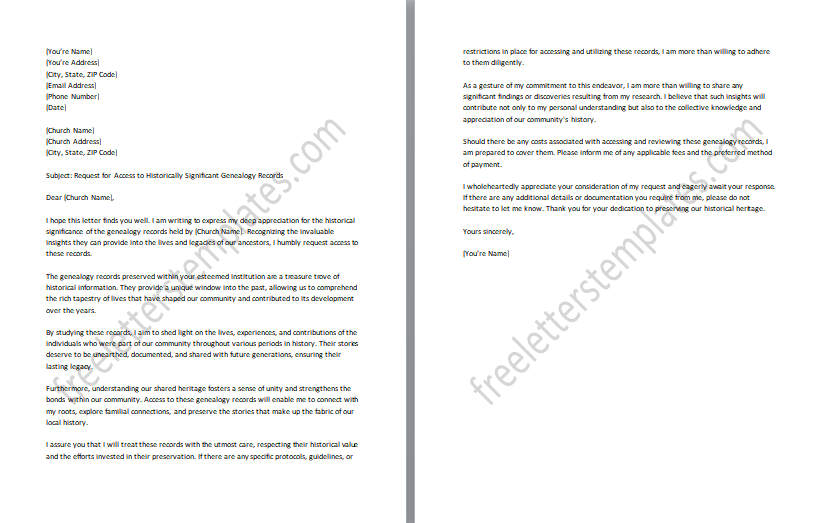
#4: Preservation Society Request:
The Preservation Society Request letter is specifically crafted on behalf of a local preservation society or historical organization seeking access to genealogy records for research and preservation purposes. This letter emphasizes the organization’s commitment to preserving and documenting the historical heritage of the community. It highlights the valuable contribution that genealogy records can make to the organization’s research projects, exhibitions, educational programs, and community outreach efforts. The explanatory paragraph within this letter underscores the significance of these records in uncovering the stories of local families, tracing the development of the community, and providing valuable insights into the social, cultural, and demographic aspects of the region’s history. By requesting access to the genealogy records, the Preservation Society Request letter aims to foster collaboration between the organization and the church, working together to promote the preservation, interpretation, and dissemination of the community’s rich historical legacy.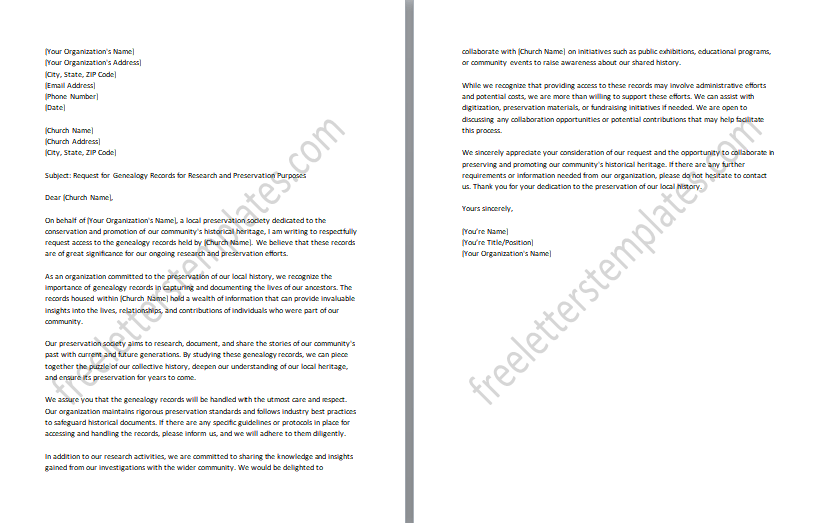
#5: Academic Research Request:
The Academic Research Request letter is specifically tailored for students or academic institutions seeking access to genealogy records for scholarly research purposes. This letter highlights the intention of conducting rigorous and systematic research within the academic framework. The explanatory paragraph within this letter emphasizes the significance of genealogy records as primary sources that can contribute to advancing knowledge in various disciplines such as history, sociology, anthropology, and cultural studies. It underscores the academic institution’s commitment to fostering research excellence and the pursuit of scholarly inquiry. By requesting access to the genealogy records, the Academic Research Request letter aims to establish a collaborative relationship with the church, acknowledging the potential scholarly value of these records and the importance of their preservation for future generations.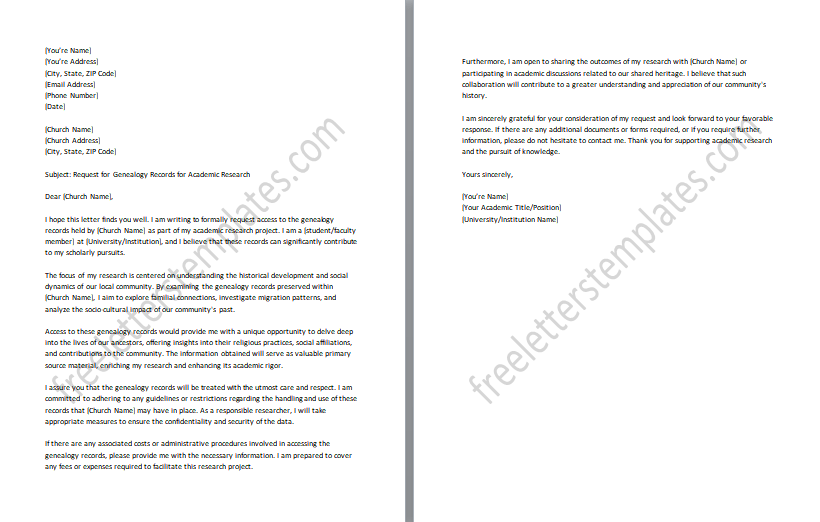
#6: Personal Ancestry Inquiry:
The Personal Ancestry Inquiry letter is tailored for individuals who are eager to delve into their family history and trace their ancestry. This letter emphasizes the personal and emotional significance of uncovering one’s roots and understanding their familial connections. The explanatory paragraph within this letter conveys the deep curiosity and desire to explore one’s ancestral heritage by requesting access to the relevant church records. It highlights the importance of these records in providing valuable information, such as birth, marriage, and baptismal records, that can shed light on family connections and ancestral lineages. By expressing a sincere interest in understanding their ancestry, the Personal Ancestry Inquiry letter seeks to establish a respectful and collaborative relationship with the church, recognizing the significance of the requested records in unraveling the individual’s personal family history.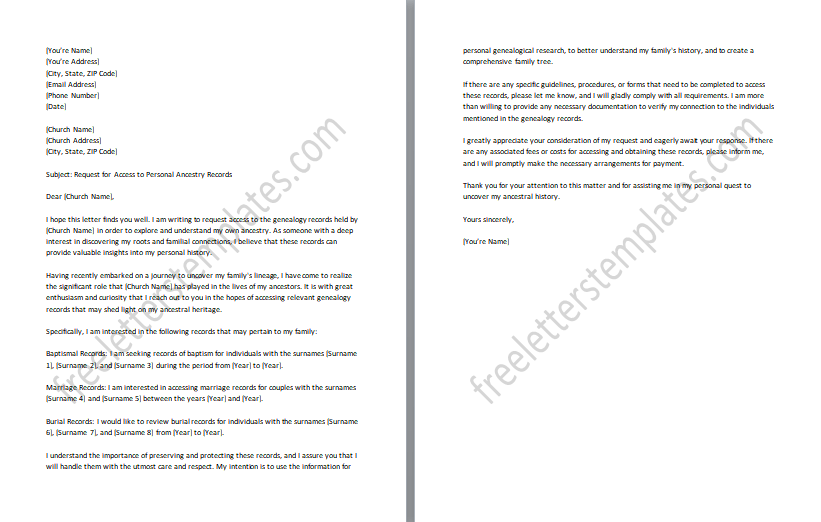
#7: Family Reunion Planning Request:
The Family Reunion Planning Request letter is specifically designed for individuals or organizers seeking genealogy records to aid in the organization of a family reunion and trace their family’s roots. This letter highlights the intention to bring family members together, foster connections, and create a memorable event centered around shared heritage. The explanatory paragraph within this letter emphasizes the importance of genealogy records in understanding the family’s history, tracing ancestral lines, and facilitating a deeper appreciation of the family’s roots. It conveys the desire to use the requested records to create a comprehensive family tree, identify distant relatives, and foster a sense of belonging and pride in one’s heritage. By requesting access to the genealogy records, the Family Reunion Planning Request letter aims to establish a collaborative relationship with the church, recognizing the value of these records in making the family reunion a meaningful and enriching experience for all attendees.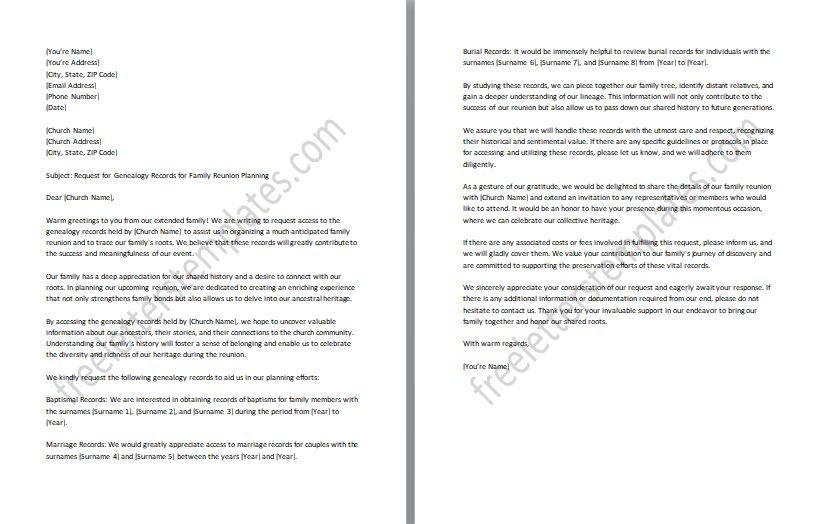
#8: Community Heritage Project Request:
The Community Heritage Project Request letter is tailored for community organizations seeking access to genealogy records for a specific heritage project. This letter highlights the organization’s dedication to preserving and promoting the local community’s heritage and cultural identity. The explanatory paragraph within this letter underscores the value of genealogy records in documenting the collective history of community members, establishing connections between past and present generations, and fostering a sense of pride in local heritage. It conveys the intent to utilize the requested records for a specific community heritage project, such as creating an archive, developing educational programs, or organizing exhibits. By requesting access to the genealogy records, the Community Heritage Project Request letter aims to establish a collaborative partnership with the church, recognizing the significant role of these records in preserving and sharing the community’s rich heritage for the benefit of present and future generations.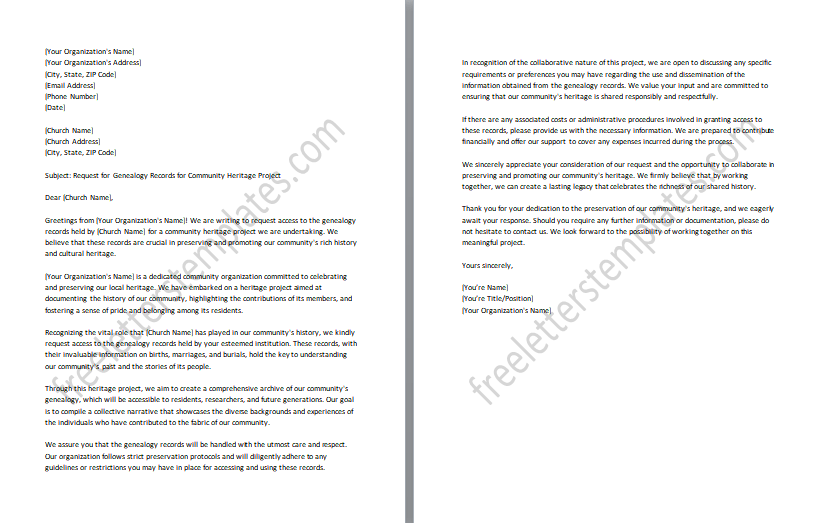
#9: Genealogy Society Collaboration Request:
The Genealogy Society Collaboration Request letter is specifically tailored for genealogy societies or groups seeking to collaborate with the church in sharing and preserving genealogy records. This letter emphasizes the shared goal of preserving and promoting genealogical information and the recognition of the church’s valuable role in maintaining relevant records. The explanatory paragraph within this letter conveys the purpose of the collaboration, which is to establish a partnership where both parties can exchange and share genealogy records of mutual interest. It emphasizes the importance of collaboration in preserving and expanding access to these records for the benefit of genealogical researchers, historians, and individuals seeking to explore their family history. By requesting collaboration, the letter aims to demonstrate the value and potential impact of joining forces to enhance the preservation, research, and dissemination of genealogical knowledge.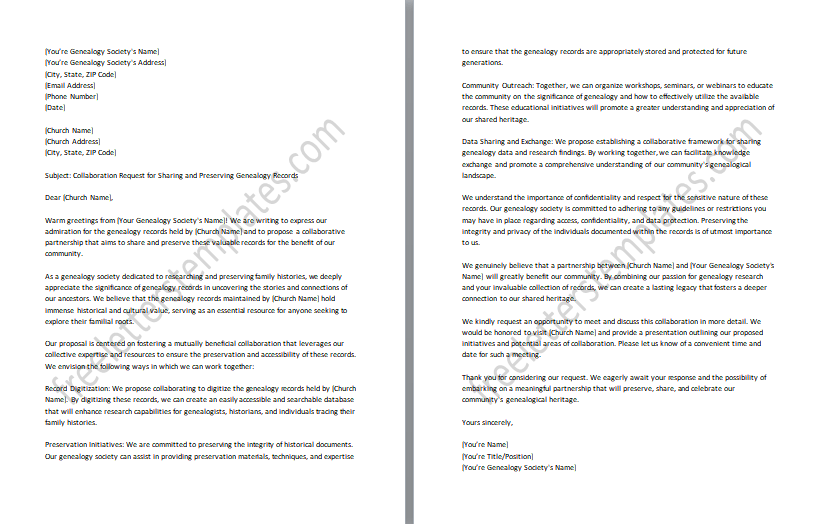
#10: Ancestor Biography Project Request:
The Ancestor Biography Project Request letter is specifically tailored for writers or historians who are seeking access to genealogy records to create biographies of significant ancestors. This letter highlights the writer’s or historian’s passion for researching and documenting the lives of notable individuals from the past. The explanatory paragraph within this letter conveys the purpose of the project, which is to uncover the captivating stories and contributions of specific ancestors and bring them to life through biographical narratives. It emphasizes the importance of genealogy records in providing the necessary historical context, vital details, and personal insights that contribute to an accurate and comprehensive portrayal of the ancestor’s life. By requesting access to the genealogy records, the letter aims to establish a collaborative relationship with the church, recognizing the value of these records in enabling the writer or historian to create engaging and informative biographies that contribute to the preservation and understanding of the ancestral heritage.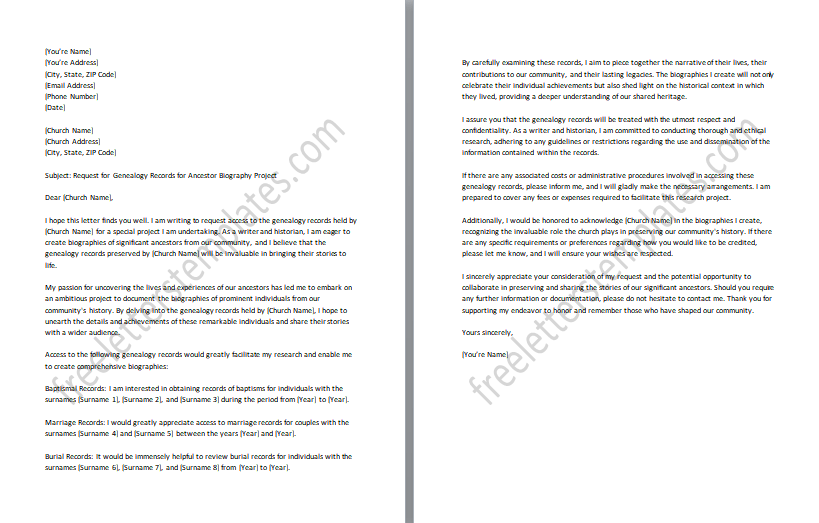
#11: Religious Heritage Research Request:
The Religious Heritage Research Request letter is tailored for religious studies scholars or researchers who are seeking access to genealogy records to study the history of the church. This letter emphasizes the academic and scholarly nature of the research, focusing on the significance of understanding the historical development, traditions, and practices of the church. The explanatory paragraph within this letter conveys the purpose of the research, which is to deepen the scholarly understanding of the church’s religious heritage and its impact on the broader community. It emphasizes the importance of genealogy records in providing valuable insights into the lineage of religious leaders, the establishment of congregations, and the evolution of religious practices. By requesting access to the genealogy records, the letter aims to establish a collaborative relationship with the church, acknowledging the role of these records in advancing religious scholarship and preserving the rich heritage of the church for future generations.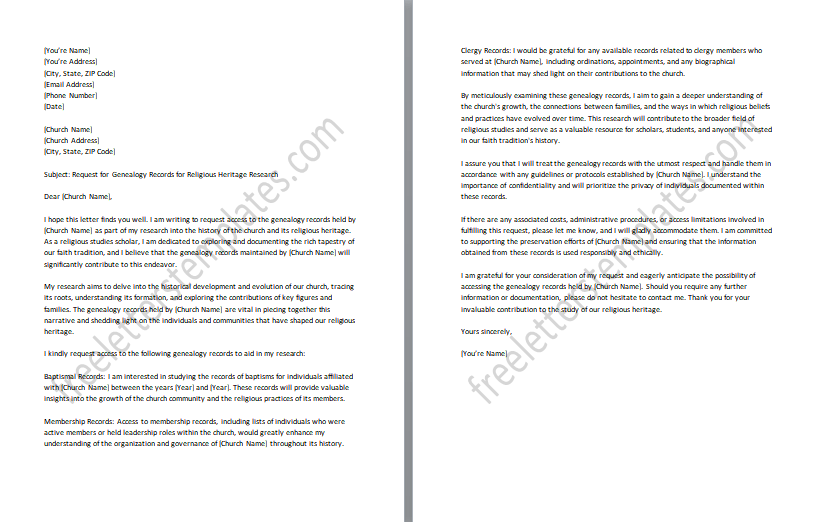
#12: Historical Fiction Novel Request:
The Historical Fiction Novel Request letter is specifically designed for authors who are seeking access to genealogy records to aid in their research for a historical fiction novel. This letter emphasizes the author’s commitment to creating an authentic and immersive historical narrative that accurately reflects the period and cultural context. The explanatory paragraph within this letter conveys the purpose of the research, which is to draw upon the rich historical records maintained by the church to ensure accuracy and bring historical figures and events to life within the narrative. It highlights the importance of genealogy records in understanding the social dynamics, family connections, and personal stories that shape the historical backdrop of the novel. By requesting access to the genealogy records, the letter aims to establish a collaborative relationship with the church, acknowledging the value of these records in providing the necessary historical depth and authenticity to create a compelling historical fiction novel.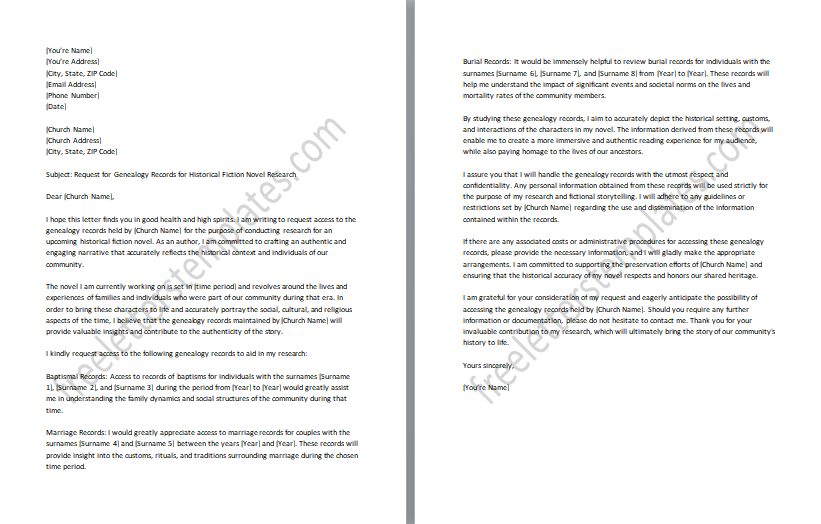
#13: Documentary Production Request:
The Documentary Production Request letter is tailored for filmmakers or documentary producers who are requesting access to genealogy records to produce a documentary about local history. This letter emphasizes the intention to capture and showcase the rich heritage and historical significance of the local community. The explanatory paragraph within this letter conveys the purpose of the documentary production, which is to delve into the intriguing stories and ancestral connections preserved in the genealogy records held by the church. It highlights the importance of these records in providing a valuable source of information and personal narratives that contribute to the authenticity and depth of the documentary. By requesting access to the genealogy records, the letter aims to establish a collaborative relationship with the church, recognizing the value of these records in bringing the local history to life on screen and fostering a greater understanding and appreciation of the community’s heritage.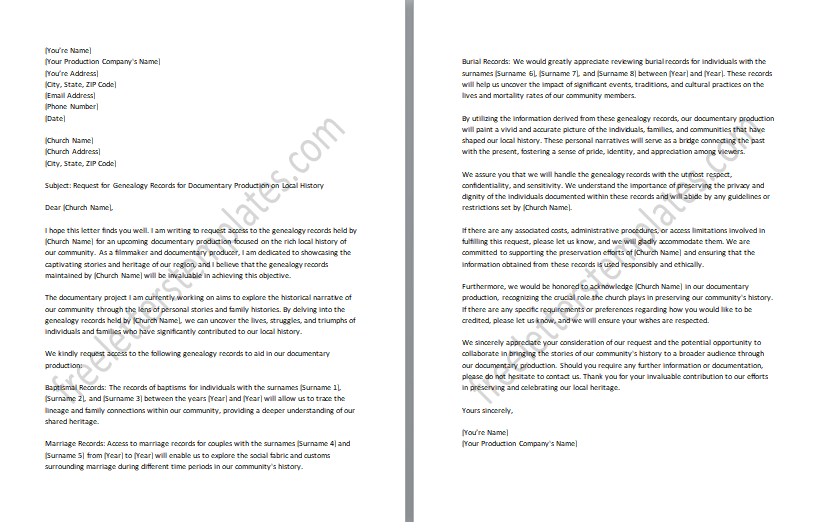
#14: Descendants’ Association Request:
The Descendants’ Association Request letter is specifically designed for associations representing descendants of a particular church community, seeking access to genealogy records. This letter highlights the shared heritage and collective interest of the association members in exploring their ancestral roots and understanding their family history. The explanatory paragraph within this letter conveys the purpose of the request, which is to provide association members with access to genealogy records that can help them trace their lineage, uncover family connections, and deepen their sense of identity and belonging. It emphasizes the significance of these records in preserving the historical narrative of the church community and enabling descendants to connect with their heritage. By requesting access to the genealogy records, the letter aims to establish a collaborative relationship with the church, recognizing the importance of these records in fostering a stronger connection between present-day descendants and their ancestral past.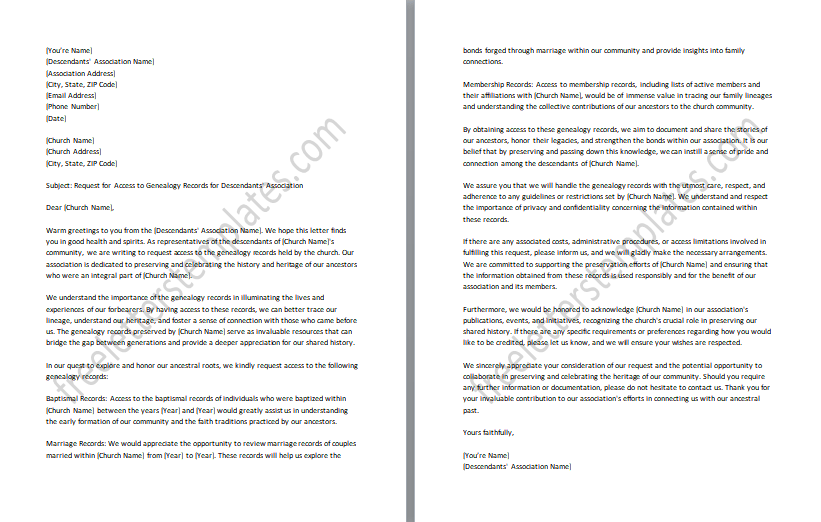
#15: Genealogy Database Expansion Request:
The Genealogy Database Expansion Request letter is tailored for online genealogy database companies seeking permission to digitize and include the church’s records in their database. This letter highlights the company’s dedication to expanding access to genealogical information and providing a comprehensive platform for individuals to explore their family history. The explanatory paragraph within this letter conveys the purpose of the request, which is to obtain permission to digitize and include the valuable genealogy records maintained by the church in the company’s database. It emphasizes the potential benefits of digitization, such as increased accessibility, preservation of the records, and the ability to connect individuals with their ancestral roots. By requesting permission, the letter aims to establish a collaborative partnership with the church, recognizing the value of their records in contributing to a broader genealogical database that can benefit researchers, historians, and individuals worldwide in their quest to uncover their family history.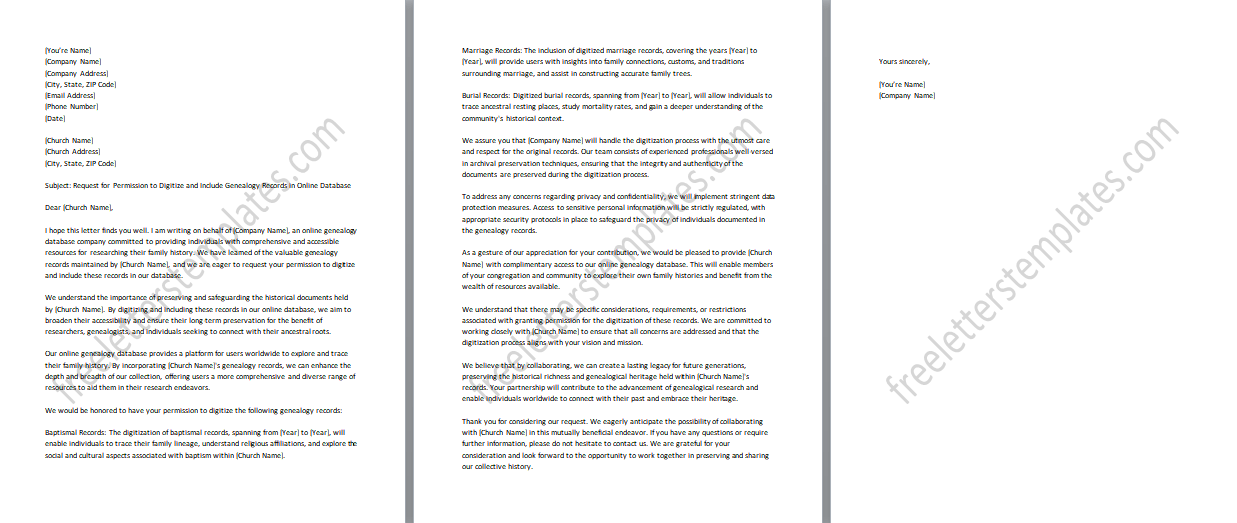
#16: Genealogy Conference Speaker Request:
A letter from a conference organizer inviting a representative from the church to speak about their genealogy records. The Genealogy Conference Speaker Request letter is specifically tailored for conference organizers who are inviting a representative from the church to speak about their genealogy records at a genealogy conference. This letter highlights the significance of the church’s genealogy records and their potential to contribute valuable insights to the conference attendees. The explanatory paragraph within this letter conveys the purpose of the invitation, which is to request the participation of a knowledgeable representative from the church to share their expertise and experiences related to genealogy records. It emphasizes the importance of showcasing the unique historical and genealogical resources maintained by the church, which can provide attendees with valuable research tips, historical context, and practical guidance in tracing their family history. By extending the invitation, the letter aims to foster collaboration between the conference organizers and the church, recognizing the church’s expertise and the value of its genealogy records in enriching the conference program and engaging the genealogy community.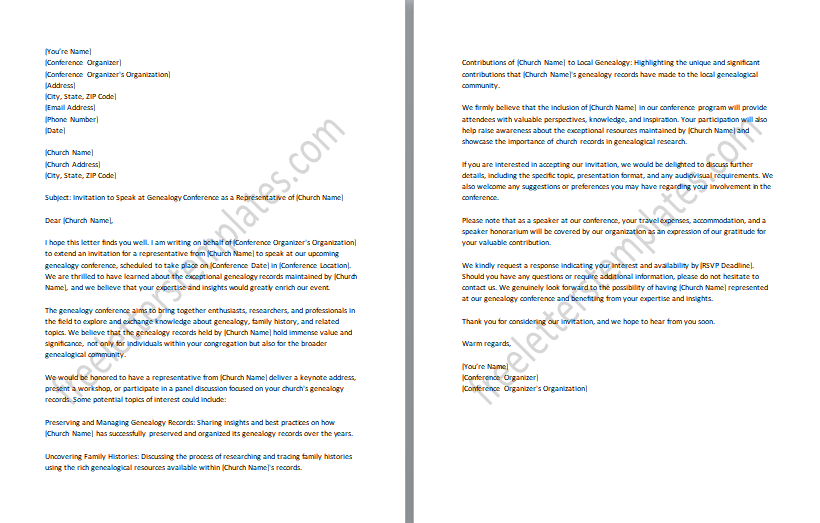
#17: Genealogy Workshop Collaboration Request:
The Genealogy Workshop Collaboration Request letter is tailored for genealogy workshop organizers seeking to collaborate with the church for a joint event focused on genealogy research and education. This letter highlights the shared interest of both the workshop organizers and the church in promoting genealogical exploration and providing resources to individuals interested in tracing their family history. The explanatory paragraph within this letter conveys the purpose of the collaboration request, which is to propose a joint event that combines the expertise and resources of the workshop organizers with the genealogy records and historical knowledge possessed by the church. It emphasizes the potential benefits of such collaboration, such as offering attendees access to unique genealogical resources, expert guidance, and interactive learning opportunities. By requesting collaboration, the letter aims to establish a mutually beneficial partnership between the workshop organizers and the church, recognizing the shared goal of fostering genealogical research, education, and community engagement.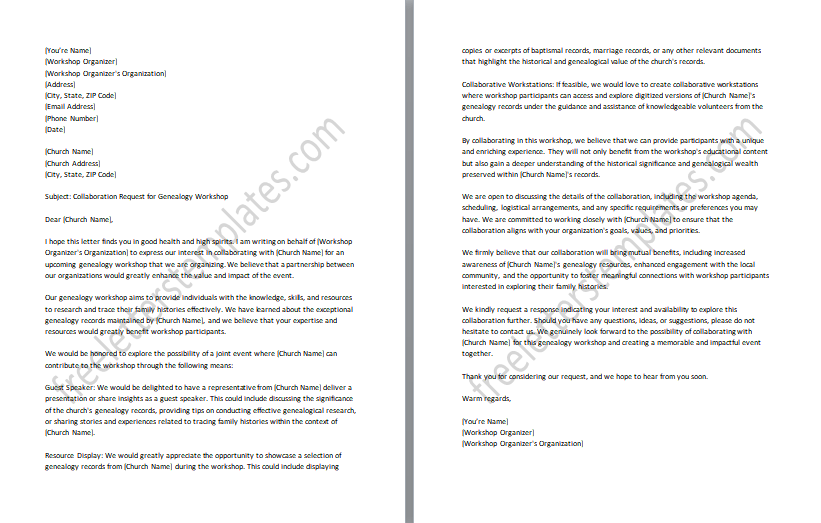
#18: International Genealogy Exchange Request:
The International Genealogy Exchange Request letter is specifically designed for foreign genealogy societies seeking to establish a collaborative relationship with the church for the exchange of genealogy records. This letter highlights the shared interest in expanding access to genealogical information and fostering cross-cultural connections through the exchange of records. The explanatory paragraph within this letter conveys the purpose of the request, which is to propose an international genealogy record exchange between the foreign genealogy society and the church. It emphasizes the potential benefits of such an exchange, such as broadening the scope of genealogical research, uncovering new connections between individuals and families across borders, and enriching the understanding of shared heritage and ancestry. By requesting the exchange of records, the letter aims to establish a collaborative partnership with the church, recognizing the value of their genealogy records in facilitating global genealogical exploration and promoting cultural exchange.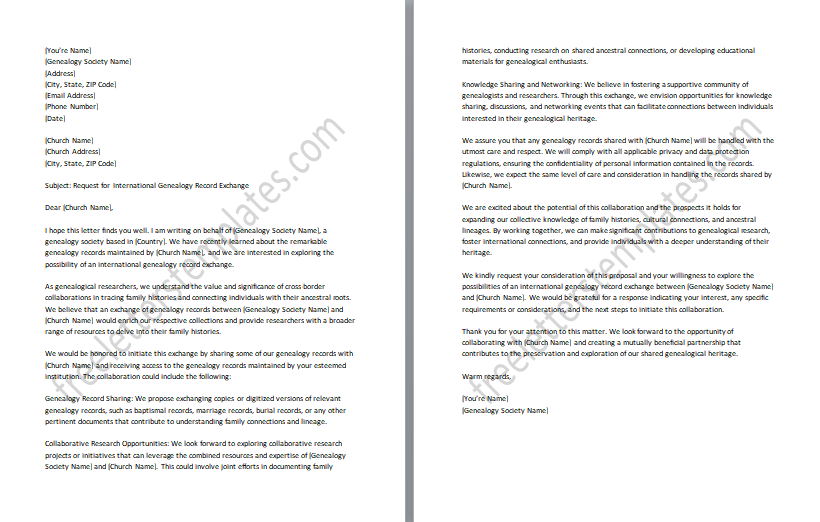
#19: Genealogy Research Fellowship Request:
The Genealogy Research Fellowship Request letter is tailored for genealogy researchers who are applying for a fellowship to conduct research using the church’s records. This letter emphasizes the researcher’s commitment to advancing genealogical knowledge and the importance of utilizing the church’s records as valuable resources for their research. The explanatory paragraph within this letter conveys the purpose of the fellowship request, which is to seek support and funding to conduct in-depth genealogical research using the church’s records. It highlights the significance of these records in uncovering historical connections, understanding family lineages, and contributing to the broader field of genealogy. The paragraph further emphasizes the researcher’s intent to utilize the fellowship opportunity to delve into the wealth of information preserved by the church, and how this research can shed light on the lives, experiences, and contributions of individuals and families associated with the church. By applying for the fellowship, the letter aims to demonstrate the researcher’s passion for genealogy, the relevance of the church’s records to their research goals, and the potential impact of their findings in advancing the understanding of family history and heritage.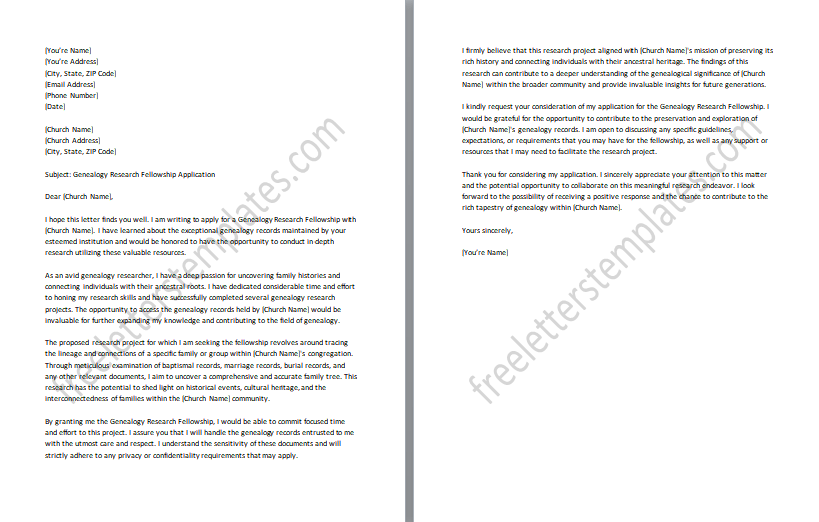
#20: School Curriculum Enhancement Request:
The School Curriculum Enhancement Request letter is specifically designed for schools seeking access to genealogy records to enhance their history or social studies curriculum. This letter highlights the school’s commitment to providing students with a comprehensive and engaging education that incorporates real-world historical research and exploration. The explanatory paragraph within this letter conveys the purpose of the request, which is to seek access to genealogy records to enrich the school’s history or social studies curriculum. It emphasizes the value of incorporating primary source materials, such as genealogy records, to provide students with a deeper understanding of their family history, local history, and broader historical events. By requesting access to the genealogy records, the letter aims to demonstrate the school’s dedication to offering a well-rounded education that fosters critical thinking, cultural understanding, and personal connections to the past. It emphasizes the potential impact of including genealogy records in the curriculum, such as promoting research skills, encouraging empathy, and fostering a sense of identity and belonging among students.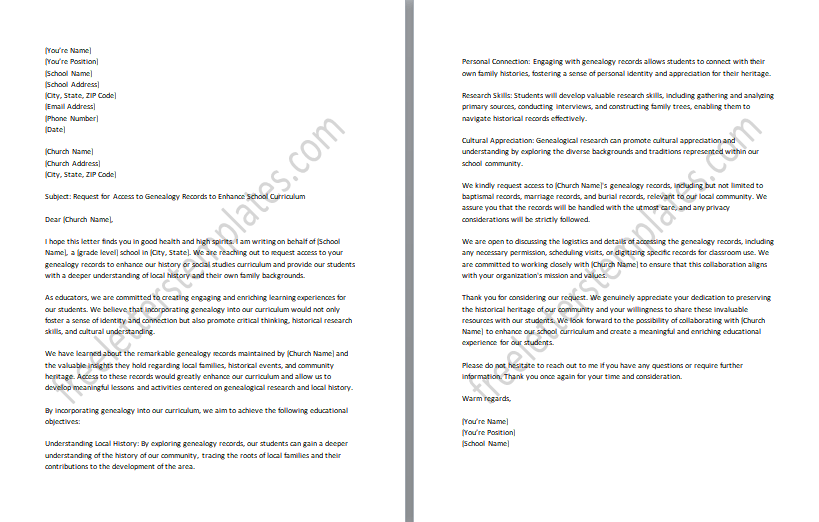
#21: Cemetery Restoration Project Request:
The Cemetery Restoration Project Request letter is tailored for a cemetery restoration group seeking access to church records to identify and restore old graves. This letter highlights the importance of preserving and honoring the historical significance of the cemetery and the need for accurate information from the church records to guide the restoration efforts. The explanatory paragraph within this letter conveys the purpose of the request, which is to seek access to the church records to identify and restore old graves within the cemetery. It emphasizes the critical role that these records play in providing vital information about the individuals buried in the cemetery, including their names, dates of birth, dates of death, and any other relevant historical details. By requesting access to the church records, the letter aims to demonstrate the restoration group’s commitment to preserving the heritage of the cemetery and ensuring the accurate identification and restoration of the graves. It highlights the potential impact of utilizing the church records, such as uncovering forgotten or deteriorated graves, reconnecting families with their ancestors, and preserving the historical legacy of the community.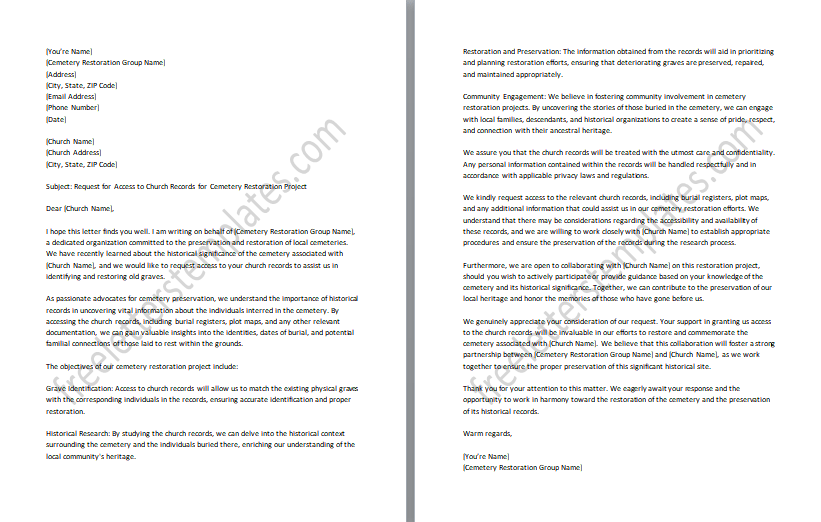
#22: Genealogy Publication Permission Request:
The Genealogy Publication Permission Request letter is specifically designed for genealogy magazines or publications seeking permission to feature or reproduce excerpts from the church’s records. This letter emphasizes the significance of the church’s records in contributing to the field of genealogy and the value of sharing this information with a wider audience through the publication. The explanatory paragraph within this letter conveys the purpose of the request, which is to seek permission to feature or reproduce excerpts from the church’s records in the genealogy magazine or publication. It highlights the potential benefits of such collaboration, including the opportunity to showcase the church’s historical records to a broader audience of genealogy enthusiasts, researchers, and historians. By seeking permission to use the excerpts, the letter aims to establish a cooperative partnership between the publication and the church, recognizing the importance of preserving and sharing genealogical information for educational and research purposes. It further emphasizes the mutual value of this collaboration, as the publication can contribute to raising awareness about the church’s historical records while providing valuable content to its readership.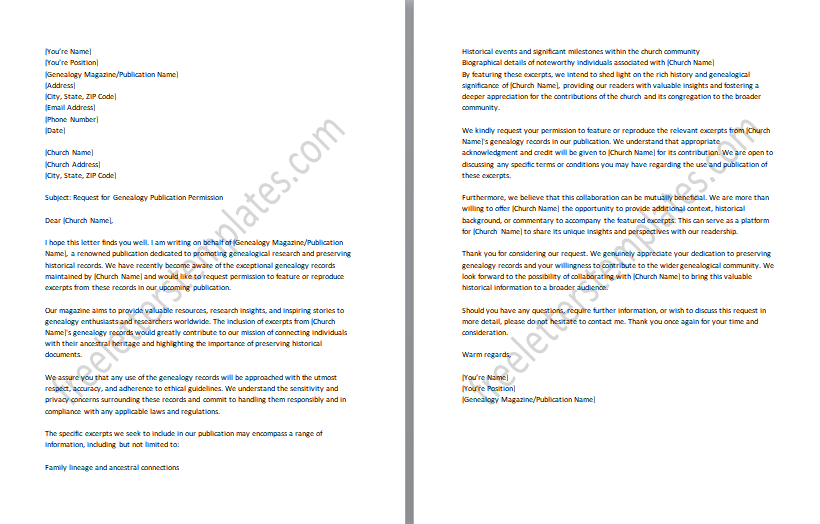
#23: Heritage Tourism Promotion Request:
The Heritage Tourism Promotion Request letter is tailored for tourism boards or organizations seeking access to genealogy records to promote heritage tourism in a specific area. This letter highlights the potential of genealogy records in attracting visitors who are interested in exploring their ancestral roots and connecting with their heritage. The explanatory paragraph within this letter conveys the purpose of the request, which is to seek access to the genealogy records to support the promotion of heritage tourism in the area. It emphasizes the value of genealogy research and the role it plays in attracting tourists who have a personal interest in tracing their family history and exploring the local heritage. By requesting access to the genealogy records, the letter aims to demonstrate the tourism board or organization’s commitment to providing visitors with an authentic and enriching experience that showcases the area’s cultural heritage. It emphasizes the potential benefits of incorporating genealogy records into tourism promotions, such as attracting a niche market of genealogy enthusiasts, fostering a deeper connection between visitors and the local community, and supporting local businesses and attractions.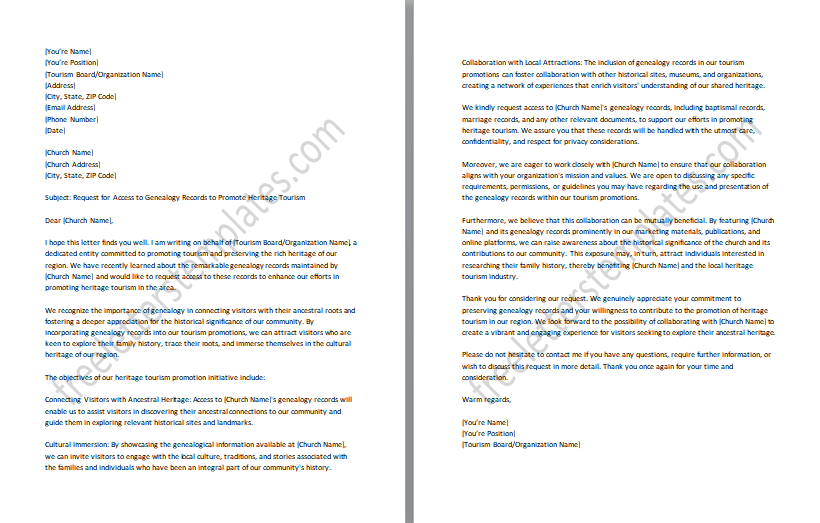
#24: Genealogy Webinar Collaboration Request:
The Genealogy Webinar Collaboration Request letter is specifically designed for a genealogy webinar organizer seeking to collaborate with a church for a joint online event. This letter highlights the mutual benefits of collaborating to provide valuable educational content to individuals interested in genealogy research and the history of the church. The explanatory paragraph within this letter conveys the purpose of the request, which is to propose a collaboration between the genealogy webinar organizer and the church to host a joint online event focused on genealogical research and the church’s historical records. It emphasizes the potential of this collaboration to reach a wider audience and engage participants in a meaningful discussion about genealogy, heritage, and the church’s historical significance. By suggesting this joint effort, the letter aims to showcase the value of combining resources, expertise, and networks to create a compelling and informative webinar that benefits both the genealogy webinar organizer and the church. It further emphasizes the potential impact of such a collaboration in fostering a sense of community, promoting historical awareness, and supporting the preservation of genealogical records.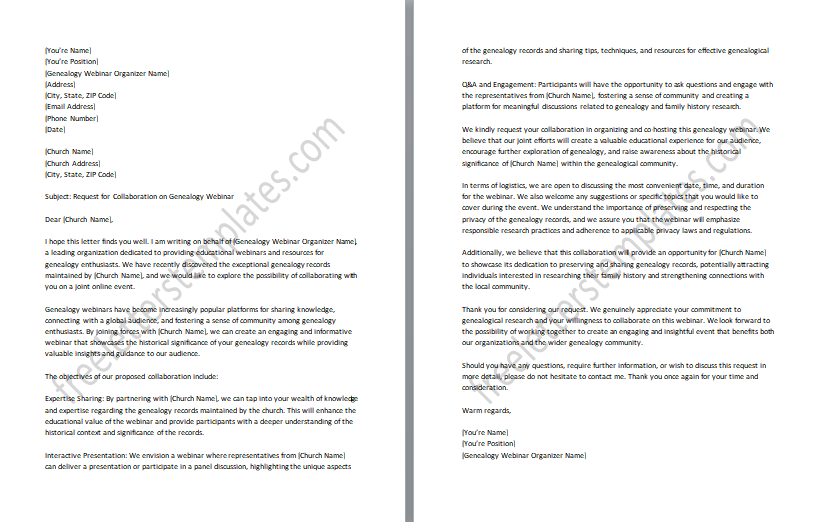
#25: Historical Landmark Nomination Request:
The Historical Landmark Nomination Request letter is tailored for a requestor seeking genealogy records to support the nomination of the church as a historical landmark. This letter emphasizes the significance of the church’s historical and cultural value and the importance of genealogy records in establishing its historical significance. The explanatory paragraph within this letter conveys the purpose of the request, which is to seek access to the church’s genealogy records to support the nomination of the church as a historical landmark. It highlights the crucial role that genealogy records play in documenting the church’s historical lineage, the individuals associated with it, and their contributions to the community over the years. By requesting access to these records, the letter aims to demonstrate the requestor’s commitment to conducting thorough research and providing substantial evidence to support the nomination. It emphasizes the potential impact of preserving the church as a historical landmark, including the promotion of local heritage, tourism, and the continued celebration of the community’s historical roots.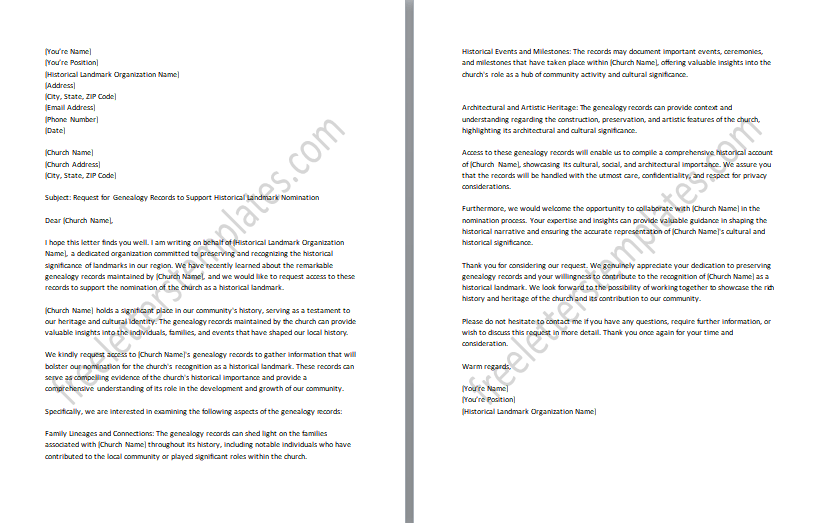
#26: Local History Research Society Request:
The Local History Research Society Request letter is specifically crafted for a local history research society seeking access to genealogy records to support their ongoing research projects. This letter highlights the importance of genealogy records in uncovering and preserving the rich local history of the community. The explanatory paragraph within this letter conveys the purpose of the request, which is to seek permission to access the genealogy records held by the church to support the research projects of the local history research society. It emphasizes the value of these records in providing valuable insights into the lives, stories, and connections of past community members. By requesting access to the genealogy records, the letter aims to demonstrate the society’s commitment to rigorous historical research and its dedication to uncovering and sharing the untold stories of the local community. It highlights the potential collaborations and knowledge exchange that can occur between society and the church, fostering a stronger understanding and appreciation of local history for the benefit of the entire community.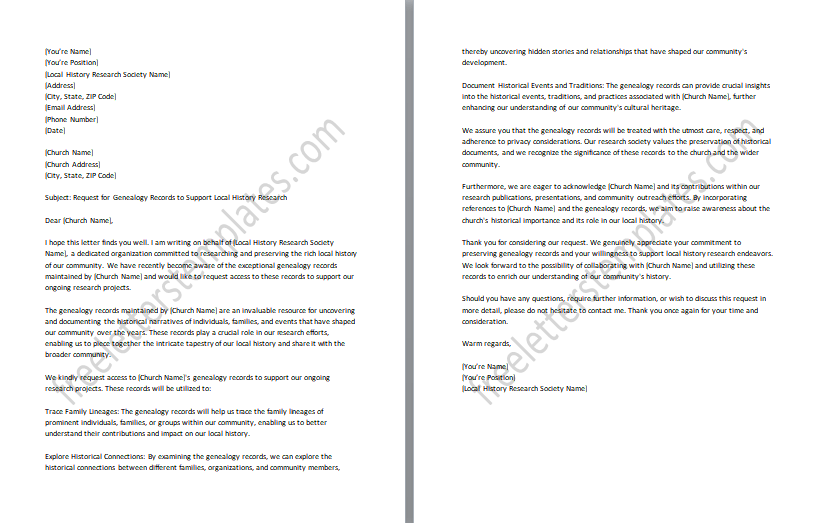
Streamline Your Genealogy Record Requests with Our Templates
- Time-saving: Using templates for your “Letter to Request for Genealogy Records from Church” can save you valuable time and effort. The templates provide a structured format and pre-written content, allowing you to quickly customize and personalize the letter according to your specific needs.
- Professional and Polished: Templates ensure that your letter maintains a professional and polished appearance. They provide a well-organized structure and language that conveys your request effectively and with clarity. This helps to create a positive impression and increases the likelihood of a favorable response.
- Guidance and Direction: Templates offer guidance and direction on the key elements to include in your letter. They suggest appropriate sections, such as the introduction, purpose of the request, and contact information, ensuring that you cover all necessary aspects and present your request in a comprehensive manner.
- Consistency: Using templates ensures consistency across different letters or requests. This is particularly beneficial if you need to send multiple requests to different churches or organizations. The consistent format and language help to maintain a professional image and streamline the process.
- Adaptability: Templates provide a flexible framework that can be easily adapted to suit your specific circumstances. You can modify the content, tone, and level of detail to align with your unique needs, whether it’s for personal research, academic purposes, or collaboration with other organizations.
- Confidence and Effectiveness: By using templates, you can feel more confident in crafting a well-structured and effective letter. The predefined sections and suggested wording help you convey your intentions clearly, increasing the chances of a positive response from the church or organization.
- Time-tested and Proven: Templates are often developed based on best practices and previous successful requests. They incorporate years of experience and expertise in the field of genealogy research, ensuring that you adopt a tried-and-true approach in your communication.
Collaborative Efforts for Accessing and Utilizing Genealogy Records
In conclusion, it is undeniable that genealogy records hold immense value and serve as invaluable resources for unraveling our ancestral roots, comprehending our cultural heritage, and safeguarding our collective history. These records sought through various types of request letters, facilitate personal exploration, academic research endeavors, community projects, and historical preservation initiatives. By acknowledging the intrinsic worth of genealogy records and establishing collaborative relationships with churches and other institutions, we can delve into the narratives of our predecessors, commemorate our shared legacy, and contribute to a profound comprehension of our bygone eras. Through our joint efforts, we can ensure the conservation and accessibility of these treasured records, enabling forthcoming generations to connect with their lineage and cherish their historical inheritance.
← Previous Article
« 17-Professional Power of Attorney Letter for Child Care: Ensuring Your Child’s Well-beingNext Article →
Notifying School Management: 20-Upcoming Leave Requests »